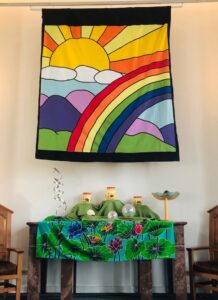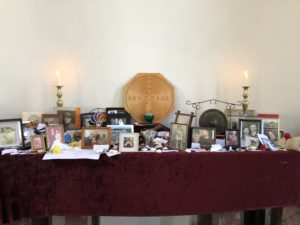The Only Way Over is Through—Grieving in Place
Rev. Karen Lewis Foley March 1, 2020
Note: A number of people have asked about the closing words following the sermon. The first line is “Life burns us up like fire,” and it is “Song VII” by John Hall Wheelock. I am not sure whether copyright law allows me to print the entire poem here, but with this much information you should be able to find it.
Sermon: What do we do with loss and grief? What does grief do with us? Sooner or later almost all of us fall into the pit. Someone we love dies and we are left alone to “get over it”. And we can lose so much in a lifetime—relationships, jobs, health, abilities, homes. Some losses are part of life processes—aging, graduating, friends moving away. Some come from choices we make—retirement, moving. Caught up in the excitement of a new choice, we might not even notice that we’re grieving what we left behind until one of grief’s sneak attacks blindsides us —a familiar smell or music, a photograph. Or an old grief breaks through a new loss. You don’t understand why you feel so broken-hearted over losing your job—until you remember your mother died about the same time of year.
I’m going to focus today on the experience of grieving the death of a loved one. But we respond similarly to all kinds of losses, perhaps not in degree of severity, but with similar resonances. So I hope if you’re grieving a loss or have done so recently, you’ll be able to “translate”—to detect, in your own experience, similar strands in what I say today about grieving a death.
So what do we do with this most dreaded of life passages, these heart-and-gut-wrenching emotions? How do we “get over it?” Anne Lamott tells us that one common responses doesn’t really work: “All those years,” she says, “I fell for the great palace lie that grief should be gotten over as quickly as possible and as privately. But what I’ve discovered is that the lifelong fear of grief keeps us in a barren, isolated place and that only grieving can heal grief….” [Traveling Mercies: Some Thoughts on Faith]
If you’ve been through it, perhaps you resonate with these words from Gail Godwin: “I could write a handbook on mourning….And the ache that you treasure, that unique wrenching ache that you hoard: you go looking for it. Contrary to what so many people try to tell you…you want to dwell in its presence, you want to protect it from this heartless, future “time” they promise you is on its way, you want to dwell in the presence of the pain, the mystery of its hold on you.” [Father Melancholy’s Daughter] Leaving our grief behind, we fear, will end our relationship with our unique beloved.
However we react, it is exhausting—whether you fight or give in, grieve openly or in private, keep busy or sit and cry—grief uses you up. It takes you down to the bone and wears you out.
My own deepest acquaintance with grief occurred more than thirty years ago, when the man I loved and expected to marry, suddenly died of a heart attack. I had grieved before, and as a minister in training I’d stood with others in their grief. But nothing had prepared me for what lay ahead. I don’t think anything ever does. Even people who’ve lost someone who’s been dying for a long time, even when death brings relief, say, “I wasn’t ready for it!”
Like all good ministerial students I knew the predictable “stages” discovered by Elisabeth Kubler-Ross—shock and denial, anger, bargaining, depression, acceptance. I’d be functioning normally in a few months, I thought, and “over it” in a year or so. How humbled I became. The stages did not behave. They arrived out of order, tumbled over each other, and overlapped. Acceptance did not arrive when expected! People made sage predictions to me of things that never happened, and things happened that no one predicted.
Among the bereaved people I’ve known, I’ve seen a lot of ways of grieving. I kept up with my schoolwork, internship, and care for my children, but a friend whose husband died at the same time needed a leave of absence from her teaching job. She was twenty years older, and I had kids and was preparing for a career, which required my continuing presence. She did what she needed; I did what I needed. People told me I was “avoiding grieving,” but they didn’t see me when I went home. Some partners sort and give away their loved ones’ things as a sort of “last gift” they can give; some can’t bear to part with those belongings. I learned to accept such differences and to say to others in grief, “Don’t let anyone tell you what you should be doing or experiencing.”
You usually find that people say things to “make you feel better” which make you feel completely misunderstood. It helps to translate. “I know how you feel” means, “I don’t want to open myself up to how bad you’re actually feeling.” “You’re strong, you’ll get through this” often means, “What you’re going through frightens me—I hope you’ll deal with it on your own.” “At least your loss isn’t as bad as mine was,” means, “I can’t bear to believe you’re suffering as much as I did.” “You can still have another baby,” or “You should adopt another cat/dog right away,” is meant to diminish the severity of your loss. It’s human nature to want to minimize or eliminate another’s pain because we don’t want to experience it ourselves.
Some will try to explain the reason for your loss: you’re being “tested” by God, or this loss is “meant” to teach you, or to save you for something bigger and better. One friend actually told me that my loved one’s death “meant” that I was not supposed to marry him! What did she think his death was supposed to mean to him!
I don’t believe God, or the cosmos, does bad things to people for inscrutable reasons. Maybe you do learn something from your loss; maybe another door does open in time. But these are not the cause or reason for your loss. They’re a way to rationalize pain. Having reasons makes us feel less lost and terrified. One of the most helpful comments I received was from Sister Mary Hennessey, a divinity school advisor. She looked me right in the eye very intently and said, “Don’t look for any meaning in this, Karen.” I was drowning in everyone’s cruel “explanations,” and Mary just said, no reason. You don’t have to understand it. We don’t need to understand. We have to endure, and that is hard enough. When you are grieving, you deserve a gold star just for getting up in the morning!
The other thing that helps when people say unhelpful things, is to remember that they truly intend to comfort you. Realizing that is what let me forgive the unhelpful comments. That, and remembering how hard it is for me to “know what to say” in the face of someone’s unfathomable loss and pain. Sooner or later we become all humans in this life together, experiencing the same kinds of joys and sorrows, and mysteries we can’t begin to comprehend.
The most healing balm is not explanations or comparisons or reassurance. None of those things are true when grief is happening to you. What does soften the gut-wrenching blow, at least in the moment, happens when someone cares enough to be unafraid in the presence of your pain. To just be with you. In the Bible, when Job loses his children, his cattle, his crops, and his body is covered with sores, his friends come to see him. You’ve heard the expression “Job’s comforters?” It’s meant ironically, because they drive Job nuts by haranguing him with explanations for his suffering. But before that, (and you seldom hear this piece of the story), when they first get there, they are so stunned by the enormity of his suffering that they simply sit with him in silence for seven days and nights. Then they were his true comforters. If only they could have continued to keep their mouths shut! A member of my internship committee called to say that he didn’t know what to say, but he and his wife wanted me to know they loved me. That was all, and all I needed. I can’t tell you how powerful those simple words were, and the fact that he actually picked up the phone to connect with me. Sometimes it takes no words. A hand on yours, a look, a bit of help with something practical. Despite my calling, I know now that a casserole is better medicine than a sermon. (Or maybe a plate of brownies!)
Sometimes grief does seem to disable a person from normal life for an unhealthy length of time. If you’re still not able to resume normal activity after several years, you may be in a depression and you do deserve help with it. But more often, the danger is that we dash through grief with eyes and hearts shut. This is Anne Lamott’s “great palace lie that grief should be gotten over as quickly as possible and as privately.” Some try to quickly replace a beloved person or way of life with another. But I’m with Parker Palmer in this, who says we must “allow death to hollow us out” in order to “be filled with life’s presence.” [Let Your Life Speak] Grief scoops us out, empties us, opens us up. If we allow this emptying, we find more room in our soul than was there before. And when there is more room in our soul, we will be filled with things we haven’t imagined. I can’t say what they will be for you, because this is particular to each individual. I can only tell you, having lived through it more than once, that I have faith in the process.
Having just said we need to allow the process of grief to happen, I have to say, too, that sometimes we’re a bit too earnest about what gets called “processing” our grief—as if you could throw grief in a blender, whip it up, drink it down and digest it. The essential task of grieving is not so much active processing, as simply, day by day, learning how to live with a big, new hole in our life. Sometimes it entails therapy. Sometimes temporary medication for a good night’s sleep. Sometimes it’s listening to the quiet song of your own heart, learning to sing solo instead of duets.
And sometimes grief swamps the faith which has sustained us. We might feel the victim of cosmic or divine betrayal, as in: “I can’t believe in a God who would let this happen!” In a World War II concentration camp, Elie Wiesel had to witness the hanging of a boy. “Where is God now?” bitterly asked the person next to him. He replied, “God is there, in that boy.” His image of God did not explain or soften the horror, but it did encompass it. It said, in essence, that God is big enough to hold that boy and his death. I’m reminded of Psalm 23 in the Hebrew Scripture: “Though I walk through the valley of the shadow of death, I will fear no evil, for You are with me.”
Grief can shatter our faith. But it can also create space for a larger and deeper faith. We may find the divine in places we hadn’t imagined It could be. Death made room in me for a new concept of life and death. It came suddenly, unexpectedly, as I stood alone in the horrible new emptiness. The old expression that death is a part of life—true enough from the perspective of being within this life—seemed suddenly, on a cosmic scale, to get it backward. The life we live on earth, I sensed, is part of a continual unfolding, part of something much larger than what is boundaried by birth and death. And I don’t know what that is. And it’s OK to not know.
We aren’t in control of grief. Grief takes us up, rips us open, and throws us down broken for a while. There may be physical symptoms, depression, confusion, and there’s almost certain to be exhaustion. The hardest thing to accept is that we can’t control this process. In order to reorient ourselves and become whole, we have to give ourselves over to it. And trust.
A widow of some years put it well when she told me, “You don’t get over loss; you just get used to it.” The hole in our life remains; but it softens with acquaintance. We lose the person, but we do not lose our relationship. As we continue to live, the relationship lives in us. We slowly find a new way to live in the world without the physical presence we treasured. But who the person was, and what the person meant to us, becomes integrated with who we are. It’s a spiritual unfolding.
Friends, we do not process grief. Grief processes us. And like any process, it turns us into something different from what we were before. We do not get over grief. We only get through it—by going through it. If we are faithful to our grief it will change us, and we will bring to life something we never had before—a transformed self. A self with new power and wholeness. And with power and wholeness, we may bless the world.












